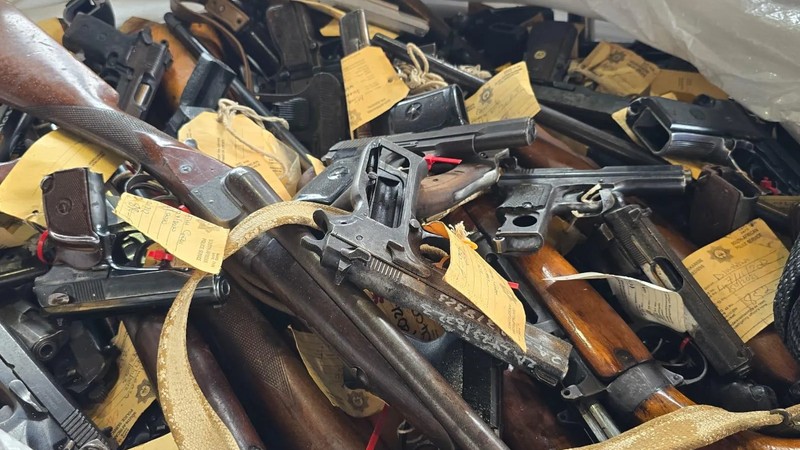Online channels used to traffic illegal firearms to the Western Cape
Police investigations into the transportation of illegal firearms in South Africa have revealed how criminals exploit online marketplaces and covert couriers to conceal transactions and move firearms.
This is after the SAPS last month arrested eight suspects in Bellville, Cape Town, during an intelligence-driven police operation for transporting illegal firearms from KwaZulu-Natal (KZN).
The raid resulted in the seizure of a significant cache of weapons, including six AK-47 rifles and eight 9mm pistols.
Both KZN and the Western Cape are major centres of gun violence in South Africa.
In KZN, gun violence is frequently linked to organised crime and mass shootings, often with complex, standing roots.
The province has a long history of intense taxi violence, with hitmen carrying out assassinations.
Drug-related killings and gang violence have also become more prominent. These conflicts are brutal, with hitmen hired to fight drug wars over territory.
The Western Cape’s gun violence is predominantly driven by chronic gang violence, particularly in the Cape Flats area.
Gang violence, especially on the Cape Flats, is a major factor in the province’s high murder rate. Firearms are used in nearly 40% of violent crimes in this region.
Gang violence is fueled by illegal assault rifles and other firearms stolen from the SAPS. In one prominent corruption case, a police colonel, Chris Prinsloo, sold thousands of guns intended for destruction to Western Cape gangs.
The Western Cape Provincial Commissioner, Lieutenant General Thembisile Patekile, said police are investigating various cases involving the transportation of illegal firearms.
He said that while investigations are ongoing, their inquiries and arrests over recent months point to several common sources and conduits for illegal firearms in the province.
Patekile revealed that criminals are increasingly using online advertisements, social media, and informal courier arrangements to conceal transactions and move firearms.
He said some firearms originate outside South Africa and enter illicit markets through intermediaries before reaching the Western Cape.
An investigation from the Global Initiative Against Transnational Organised Crime (GI-TOC) recently revealed how trucks transporting fresh goods such as flowers and fruits were used to smuggle weapons from Namibia to the Western Cape for criminal networks.
These weapons included pistols and AK-47 rifles, with criminals capitalising on the short shelf life of these products to move them quickly.
“Local organised groups buy, store and redistribute weapons inside the province and other areas. These networks often use coded communications, recruiters and corrupt intermediaries,’’ Patekile said, adding that organised criminal networks also exploit porous borders, maritime routes and containerised cargo to move illicit weapons into the country.
Ports and informal border crossings are priority areas for interdiction, he said..
Patekile added that firearms from stolen private homes, licenced owners, security companies, or diverted from lawful supply chains also find their way into criminal hands.
He said police are conducting targeted intelligence-led operations to locate caches, arrest syndicate members and seize firearms and ammunition to deal with the situation.
“We are working closely with national SAPS units, Border Management Authority, ports and customs officials, and other law-enforcement agencies to disrupt illegal importation routes. We are increasing visible and covert policing in high-risk areas, and prioritising hot-spot enforcement where gun violence is most concentrated,’’ he said.
Patekile said police are also strengthening partnerships with community structures, neighbourhood watches, the private security industry and provincial departments to improve information flow and prevention.
In the 2021 report, How to Silence the Guns-Southern Africa’s Illegal Firearms Markets, the GI-TOC (Global Initiative Against Transnational Organised Crime) found that criminal networks frequently involve corrupt officials who provide protection or enable movement through fraudulent documentation. The report noted that criminal networks all too often involve corruption, including officials within police and government departments who directly supply firearms, facilitate their movement through fraud and corruption, or turn a blind eye.
Gun Free South Africa said, unless there is genuine accountability and consequences for corrupt officials, the situation will continue to deteriorate.
The organisation said weak governance and lack of accountability have created the conditions for the gun violence crisis that South Africa is currently experiencing, in which 33 people are shot dead every day.
“Corruption plays a huge role. The case of corrupt cop Prinsloo, who supplied at least 2,400 firearms from police stores to criminal groups, illustrates the scale of the problem. In 2020, 28 people were arrested, including high-ranking police officers and Cape Town underworld figures, for fraudulently procuring firearm licences. Unless there is genuine accountability and consequences for corrupt officials, the situation will continue to deteriorate,” said research and policy analyst Claire Taylor.
She said these firearms amplify the capacity of criminals to commit violent crimes, from drug-related turf wars to robbery and extortion.
Willem Els, a crime expert at the Institute for Security Studies (ISS), said the market for illegal firearms is massive and wide, adding that the majority of murder cases involve illegal firearms.
Els said that due to the availability of firearms, some syndicates specialise in the supply of illegal firearms to other organised criminal syndicates. He said these syndicates also rent out the firearms.
He said these firearms are being used for organised crimes such as rhino poaching, cash-in-transit heists, and assassinations.
Crime Intelligence head Dumisani Khumalo also detailed how criminal elements have infiltrated the justice system, using illegally acquired firearms as part of their operations during his testimony at the Madlanga Commission earlier this month.
manyane.manyane@inl.co.za

